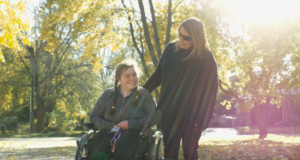Educating Outside the Lines: The Importance of Learning about Disability Early in Life
by Beth
I am delighted to have Patty O’Machel back with us as a guest blogger. Patty is a writer, special needs advocate and mom. Her blog Parenting Outside The Lines collects and shares the stories of parents all over the world who are raising children with special needs, and her guest post today lets you in on another “Outside the Lines” project she launched last year.
by Patty O’Machel

Patty (right) and her daughter (left)
“Acceptance” and “understanding differences” are the hot terms of the day, and used with abandon. But what do they really mean in today’s culture? They could speak to the way immigrants are seen in our country. They could speak to the LGBTQ community, and how the way in which people identify themselves is often different then the way they are “supposed” to present to the world.
As for me, I look for understanding of disabilities and abilities. Simply put, I want children with all abilities to be accepted and seen for their unique gifts, as varied as they are.
As the school year begins, I am gearing up to bring my company, Educating Outside The Lines, into more schools in our communities. I want to teach children that their peers with disabilities and differences can do amazing things. Last year, Educating Outside The Lines programming reached over 7,500 children with the message of understanding and accepting differences. I want to reach more!
Focusing on teaching kids about those things that may be different in their peers, creating an environment of acceptance – it all helps to bridge the gap of isolation. Rather than being afraid of differences, kids start to understand and embrace them.
My Educating Outside the Lines program uses a hands on approach to learning. Kids get to use wheelchairs, and touch prosthetic legs and arms. They get to use braillers and learn sign language. They learn about the disabilities you cannot see, like dyslexia and ADHD, and how struggles in one area can foster super powers in others. Children learn that everyone has things they are good at and struggle with, and how things like wheelchairs, communication boards, service dogs and braille books are just tools people use to help them do the things they do.
Children who learn acceptance at an early age take these lessons with them into adulthood. Instead of fearing differences, they strive to understand, and if you think of it, bullying stems from a lack of understanding, so teaching children to understand and appreciate differences can help combat bullying.
Let’s face it. Every one of us is different and unique. We are all good at some things, and boy, do we struggle with others. And everyone we meet and interact with everyday, from friends to coworkers, also have differences. Our kids are living in the same world. They will have classmates and friends who have differences and disabilities. They will have teachers, doctors and coaches with disabilities and differences. If we consciously teach them about these differences when they are young, then we are creating a community of people who embrace others and don’t let fear of differences dictate their lives.
Through dynamic speakers, simulations, and hands-on learning and activities, students at the schools we visited last year were able to learn about all sorts of disabilities and abilities. For example, students who played wheelchair basketball learned specific skills necessary to excel in that sport. Same goes for the athlete who had the kids touch the prosthetic leg she uses when running marathons and compare it with the prosthetic leg she uses for everyday tasks. It all left kids thinking about using different tools for different needs. Coordinated learning on the other side, where students did an Americans with Disabilities Act compliance study of their school and community really brought the message to life. Offering students different views of disability gave them an opportunity to witness the balance of ability and what people can truly do given the right tools to succeed.
At the start of this school year, let’s teach our kids to see the world a little differently. The lessons about reading and math will go with them into adulthood, but let’s also teach them to truly understand and accept their peers with different abilities.
If you would like to see Educating Outside The Lines in action, this link has a short video of programming.






